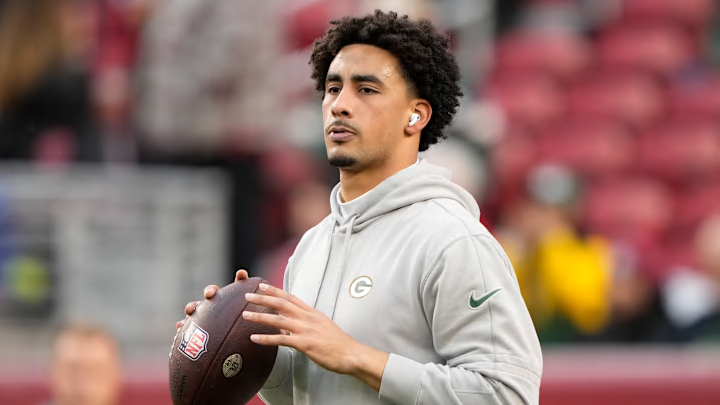The careers of Jordan Love and Aaron Rodgers will always be connected.
Both players were surprising first-round picks while the Green Bay Packers already had a Hall of Fame quarterback. They each had to wait three years before getting an opportunity to start, and they both landed massive new contracts.
Well, Love's hasn't happened yet, but it's coming.
The Packers had to wait until May 3 to sign Love to a new deal due to the extension they agreed to a year earlier. The only remaining questions are how soon Love will get paid and how much he will earn.
Former sports agent Joel Corry wrote a fascinating article for CBS Sports, detailing how much Love's new deal could be worth and why Rodgers could have a significant impact.
Former agent believes Aaron Rodgers will 'loom large' over Packers negotiations with Jordan Love
The parallels between Love and Rodgers don't end there. Corry notes that both players are represented by Athletes First.
"Aaron Rodgers, Love's predecessor as Packers quarterback, is likely going to loom large in negotiations of a new deal for a variety of reasons," writes Corry.
The Packers signed Rodgers to an extension only seven games into his first season as a starter. Rodgers had thrown for 1,668 yards and 12 touchdowns with four interceptions in a 4-3 start. Green Bay had seen enough.
Love, surrounded by a far less experienced supporting cast than the one Rodgers inherited, got off to a slow start, but it was his final eight games that stood out. Love completed over 70 percent of his passes for 2,150 yards and 18 touchdowns with one interception, leading the Packers on a magical 6-2 run and into the postseason.
It helped Love post better stats in completion percentage, passing yards, passing touchdowns, interceptions, and passer rating than Rodgers in his first year starting.
Corry believes Love's team may ask for a similar deal to the one Rodgers signed in 2022, averaging over $50 million per year.
"It wouldn't be surprising for Love's camp to not only target more than this deal, but to insist on their client becoming the league's highest-paid player, like Rodgers," writes Corry.
He adds that Green Bay would "surely push back" on that request, as Rodgers had just won consecutive NFL MVP awards. However, he was also 38 years old. Love is just 25 with the best years of his career very much in front of him.
There are pros and cons to the Packers' way of drafting and developing quarterbacks.
Clearly, giving Love time to sit for three years, get coached, and learn from Rodgers has accelerated his development. It protected him from starting too soon, allowing him to become the franchise quarterback he is today.
The downside is that Green Bay doesn't get the benefit of watching Love play throughout the entirety of his rookie contract. It's time to sign him to an extension after only one season as a starter.
It leads to some risks. Have the Packers got enough of a sample size to make Love one of, if not the highest-paid quarterback in the NFL? That's not a choice they have.
Another fascinating point from Corry is about the unique circumstances the Packers find themselves in with Love, making it comparable to the first extension Rodgers signed in 2008.
"Ordinarily, a team would be able to easily distance itself from a deal done over 15 years ago. That isn't the case with the Packers," writes Corry. "Current Packers president and CEO Mark Murphy served in the same capacity when Rodgers signed his first veteran contract. He assumed these roles in January 2008."
The Packers made Rodgers one of the league's highest earners after only seven games in his first year starting. Love has completed a full season and reached an MVP level in the final eight games before backing it up with a near-perfect playoff debut.
Green Bay doesn't want to risk having negotiations drag out into the summer or even beyond that. That gives Love's team plenty of leverage, especially with several star quarterbacks due extensions in the near future, including Dak Prescott and Tua Tagovailoa.
The parallels between the careers of Love and Rodgers are hard to believe.
Both were drafted in the first round, sat for three years behind a Hall of Famer, and then said Hall of Famer got traded to the New York Jets. Now, after a similar breakout season to Rodgers' in 2008, it's time for Love to get paid.
And the Rodgers factor will likely play a significant role in Love's career yet again.
